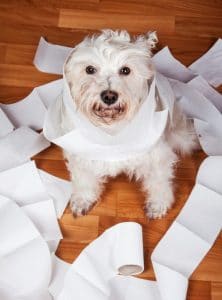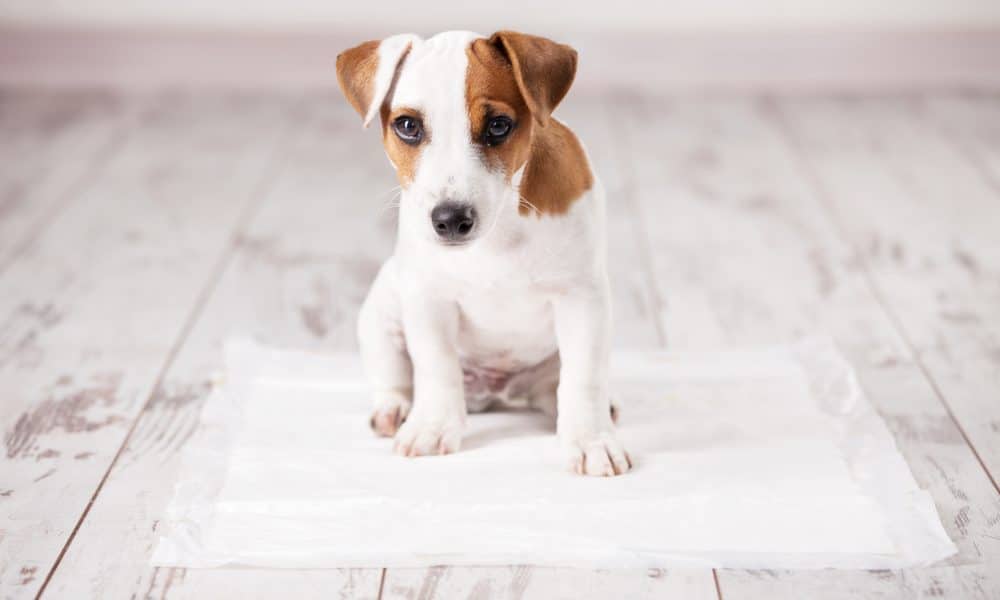Toilet training has to be one of the most common challenges that we face when we adopt a new puppy – and ultimately the first thing we all want to teach them as soon as they step paws into our home!
You won’t have to wait long to discover that puppies go to the toilet- a lot! And no matter how well you think you house train, it’s quite likely there will be some accidents to clean up. Since they are growing and developing rapidly at this stage, they eat more food, burn up more energy and seem to need the toilet constantly! Puppies have not yet developed bowel and bladder control, so unfortunately they can’t ‘hold it in’ as long as adult dogs can! Training your puppy to toilet outside can be frustrating and a lengthy process but it’s all about consistency, patience and positive reinforcement. It typically takes anywhere between 4 and 6 months for a puppy to be fully toilet trained, but some puppies may take longer. Size can often be a predictor, with smaller breeds having smaller bladders, meaning more frequent trips outside.
And while you’re training, don’t worry if there are setbacks. As long as you continue to take your puppy out at the first sign he needs to go and offer him rewards, he’ll learn.
Spotting the signs
It won’t take you long to pick up on the warning signs when nature calls! But that doesn’t mean warning signs are what to wait for – you should always give your puppy the opportunity to go to the toilet at least every two hours throughout the day. You can usually tell when your puppy needs the toilet when he looks around anxiously, walks in circles or start sniffing in corners for a place ‘to go.’ If you notice any of these tell tale signs, walk him outside to the toilet area. Puppies need to urinate immediately after waking up, so you need to be there to take your puppy straight into the garden without any delay. Eating also stimulates the digestive system, and puppies will normally urinate within fifteen minutes of eating. It can also happen spontaneously, especially when your pup gets excited – so take him out frequently!
Puppy pads
To begin with, you may want to start using puppy training pads to put on the floor or newspaper to teach your pup to go in the correct place when inside. Once you have he trained there, you can start moving him outside. The main advantage of these absorbent pads is that they make clean-ups easier, so while your puppy is being crated, or is in his den or playpen, you can put a puppy pad down to absorb any mess.
Assigning a toilet area
Most puppies like to go to the toilet somewhere natural, and bark or grass gives them an environment where they can pick up their scent from earlier. The most important thing is to keep their toilet area clean by clearing up any messes every day to encourage them to go back. Leftover mess in their toilet area can put them off, and they may look for other areas to do their business. Once you’ve established a toilet area, take your puppy there to let them use it and always remember to reward them when they go. If they sniff around but don’t do anything, give them a few minutes then pick them up and take them away – this might sound risky but it’s important for them to understand that it’s their toilet area and not somewhere to play and explore.
Crate training
When your puppy needs a break, send him to bed somewhere that will limit any accidents. For puppies who love to chew things like power cords, crates can become a safety precaution that can stop your dog getting into mischief when you can’t watch them. If you’re using a crate as a cosy place for your puppy to sleep or relax, you can also use it as a house training aid. Puppies won’t want to toilet in their bed so they’ll begin to learn bowel and bladder control. By putting your puppy in their crate for a short time before they’re taken outside, they learn to associate indoors with control and outdoors with the toilet.
Accidents happen
It’s inevitable that accidents will happen! If your puppy does go indoors, just remember that it is all part of the learning process. If you discover a little puddle or a mess, whether or not you were there when it happened, just clean it up without making an issue out of it. Punishing your puppy for having an accident is a definite no. All it does is teach your puppy to fear you. Never get angry or shout. If you catch your puppy in the act, just calmly take them to the toilet area to finish off what they started. Puppies aren’t intellectually capable of connecting your anger with their accident.
Common errors
Here are some reasons why toilet training may not go as smoothly as it could:
- Overfeeding
- Not feeding at regular times
- Punishing your puppy for indoor accidents
- Leaving the back door open for your puppy to come and go as it pleases (this will make them think of the garden as a play area rather than a toilet area)
- Leaving your puppy on his own for too long



